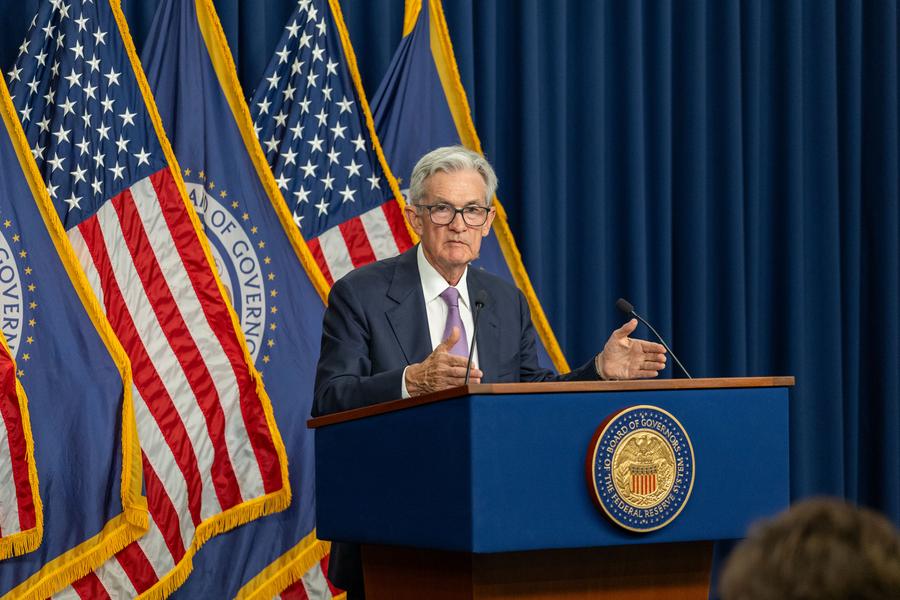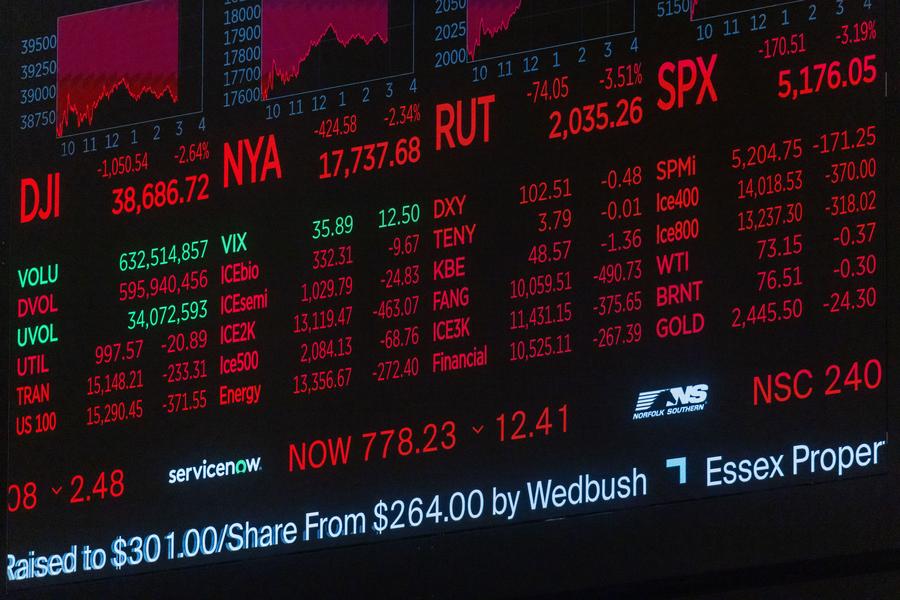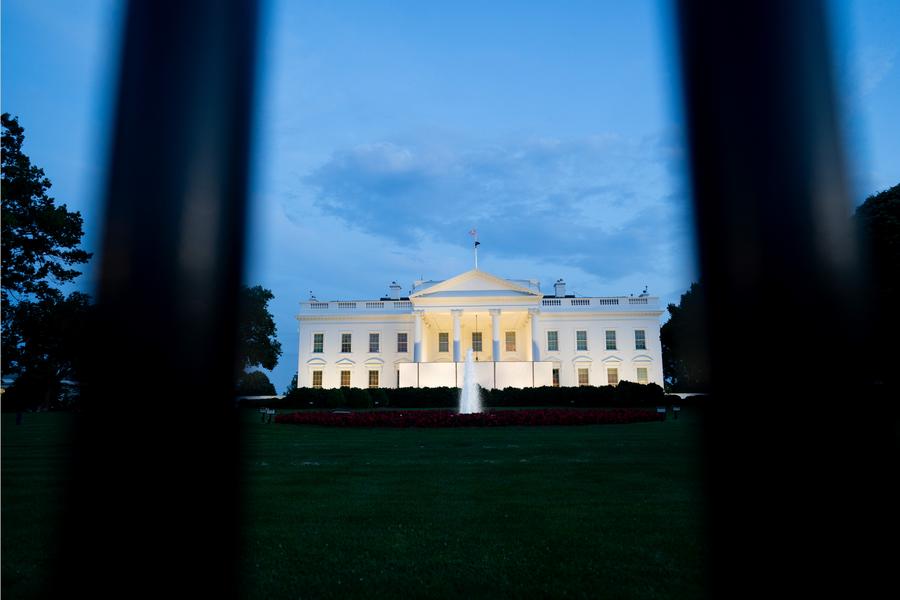
 U.S. Federal Reserve Chair Jerome Powell attends a press conference in Washington, D.C., the United States, on Sept. 18, 2024. (Xinhua/Hu Yousong)
U.S. Federal Reserve Chair Jerome Powell attends a press conference in Washington, D.C., the United States, on Sept. 18, 2024. (Xinhua/Hu Yousong)
Amid cooling inflation and a weakening labor market, the U.S. Federal Reserve on Wednesday cut interest rates by 50 basis points, a bolder move than many experts and media had previously anticipated.
Amid cooling inflation and a weakening labor market, the U.S. Federal Reserve on Wednesday cut interest rates by 50 basis points, a bolder move than many experts and media had previously anticipated.
"The Committee has gained greater confidence that inflation is moving sustainably toward 2 percent, and judges that the risks to achieving its employment and inflation goals are roughly in balance," said the Fed in a statement.
"This decision reflects our growing confidence that, with an appropriate recalibration of our policy stance, strength in the labor market can be maintained in a context of moderate growth and inflation moving sustainably down to 2 percent," Fed Chair Jerome Powell said at a press conference after a two-day Fed meeting.
 The U.S. Commerce Department is seen in Washington, D.C., the United States, April 25, 2024. (Xinhua/Liu Jie)
The U.S. Commerce Department is seen in Washington, D.C., the United States, April 25, 2024. (Xinhua/Liu Jie)
MIXED RESPONSES
Some have criticized the Fed, arguing that it was too slow to implement a rate cut.
"The Fed doesn't like to admit policy errors, but some of the decision for a larger initial cut is likely to get caught up as it found itself behind the curve by one meeting," said Ryan Sweet, chief U.S. economist at Oxford Economics, wrote in a note.
Brookings Institution Senior Fellow Barry Bosworth, however, told Xinhua that a 50-basis point cut is "justified."
"The prior delay was reasonable as they waited for confirming evidence of a slowing of the economy and inflation," Bosworth said.
Starting from March 2022, the Fed had raised rates 11 times consecutively to combat inflation, pushing the target range for the federal funds rate up to between 5.25 percent and 5.5 percent, the highest level in over two decades.
After maintaining rates at a high level for over a year, the Fed's tight monetary policy faced pressure to pivot due to the easing of inflationary pressures, signs of weakening in the job market and slowing economic growth.
Many view the Fed's decision as the beginning of a cycle of rate cuts.
Dean Baker, a senior economist at the Center for Economic and Policy Research, expects another cut in the next Fed meeting, a view shared by other economists.
 A monitor displays stock market information on the trading floor of the New York Stock Exchange (NYSE) in New York, the United States, on Aug. 5, 2024. (Photo by Michael Nagle/Xinhua)
A monitor displays stock market information on the trading floor of the New York Stock Exchange (NYSE) in New York, the United States, on Aug. 5, 2024. (Photo by Michael Nagle/Xinhua)
ECONOMIC IMPLICATIONS
A rate cut could help the U.S. economy, especially by boosting home sales and driving economic activity, said experts.
"The biggest impact will be sales of existing homes and mortgage refinancing. It will also relieve some stress on banks and startups paying high rates," said Baker.
Rate cuts could also help the U.S. stock market, according to experts.
The Fed's rate cut was met with optimism in mid-afternoon trading on Wall Street, although gains were erased by day's end.
Rate cuts are likely to bode well for dividend stocks, especially those in the financial sector, as lower rates bring down banks' funding costs.
Rate reductions could also be a boon to real estate stocks, as that could reduce costs for home buyers.
 This photo taken on May 22, 2024 shows the White House in Washington, D.C., the United States. (Xinhua/Liu Jie)
This photo taken on May 22, 2024 shows the White House in Washington, D.C., the United States. (Xinhua/Liu Jie)
DIFFERENT INTERPRETATIONS
The Fed's announcement made less than 10 weeks before the presidential elections, comes amid a neck-and-neck race for the White House.
Powell repeatedly said that the Fed is an independent institution, and politics is not a factor that the Federal Open Market Committee members consider when making decisions on rate cuts.
Anything the Fed does "will be based on the data, the outlook, and the balance of risks and not on anything else," he said.
Nevertheless, former President Donald Trump, the Republican presidential nominee, has said any move ahead of November would be political.
"I think it will contribute to Harris' argument that the economy is robust and growing and heading in the right direction," Christopher Galdieri, a political science professor at Saint Anselm College, told Xinhua.
However, experts also noted that Trump and Vice President Kamala Harris, the Democratic nominee, could interpret the Fed's move in different ways.
"Harris will say the economy is turning around...Trump will deny all those things," Brookings Institution Senior Fellow Darrell West told Xinhua.
今年1月,新冠疫情突然而至。为了防止疫情扩散,我国采取了史无前例的交通阻断及人流限制措施,这也为我国农业农村经济发展带来了巨大挑战。
